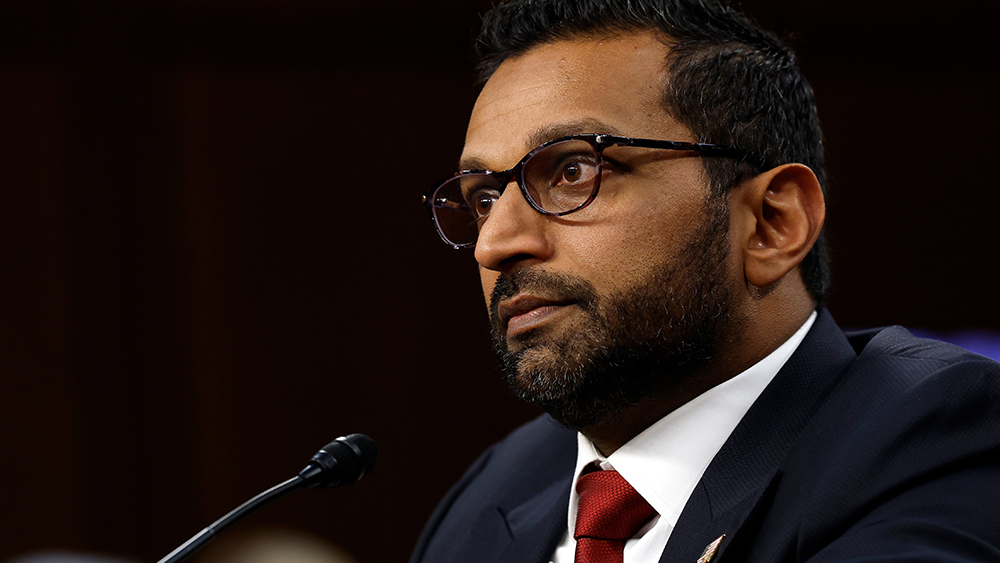Source: Natural News | VIEW ORIGINAL POST ==>

- Kash Patel confirmed as new FBI director by a narrow Senate vote of 51-49.
- Patel, a Trump ally, aims to increase accountability and transparency at the FBI. His confirmation represents a conservative effort to address perceived bias within the FBI.
- The nomination was highly polarizing, with Democrats raising concerns about Patel’s qualifications.
- Patel faces significant challenges, including rebuilding trust and navigating internal strife within the FBI.
In a pivotal moment for the Trump administration and the future of the FBI, the Senate confirmed Kash Patel as the new director of the Federal Bureau of Investigation on Thursday. The vote, narrowly passed 51-49, marks a significant victory for President Donald Trump and his mission to reform the bureau, which he has long criticized for its perceived bias against conservatives.
Patel, a close ally of President Trump and a vocal critic of the FBI, has promised to bring a new level of accountability and transparency to the agency. His confirmation comes at a time of significant turmoil within the FBI, with recent leadership changes and ongoing investigations into the January 6 Capitol riot.
A vision for reform
Patel’s ascension to the top of the FBI is not just a personal triumph; it represents a broader conservative effort to address what many on the right see as systemic issues within the bureau. For years, conservatives have alleged that the FBI has been weaponized against political opponents, particularly during the Trump presidency. Patel, known for his sharp critiques of the bureau, is seen by many Republicans as the right man to clean house.
“Kash is the right man to clean up the FBI to restore Americans’ confidence and trust that the FBI is not a political organization, it is a law enforcement organization,” Senator Lindsey Graham (R-S.C.) stated on social media. “The American people deserve an FBI that is fair, impartial and focused on protecting our nation’s security and freedoms.”
The road to confirmation
Patel’s path to confirmation was marked by intense scrutiny and opposition from Democrats, who raised serious concerns about his qualifications and temperament. Despite his background as a public defender, federal prosecutor and congressional aide, Patel’s lack of experience in senior law enforcement roles was a significant point of contention.
Senator Dick Durbin (D-Ill.), the ranking member of the Senate Judiciary Committee, spoke out strongly against Patel’s nomination. “Mr. Patel will be a political and national security disaster, if confirmed,” Durbin said during a press conference outside FBI headquarters. “He has neither the experience, the judgment, nor the temperament to lead the FBI. My Senate Republican colleagues are willfully ignoring myriad red flags about Mr. Patel, especially his recurring instinct to threaten retribution against his perceived enemies.”
The confirmation vote reflected these deep divisions, with only two Republicans—Senators Susan Collins (R-Maine) and Lisa Murkowski (R-Alaska)—joining all Democrats in opposing Patel. The narrow margin underscores the contentious nature of Patel’s nomination, which has been described by some as one of the most polarizing in recent memory.
Challenges ahead
Patel takes over the FBI at a critical juncture. The bureau is grappling with internal strife, including the recent departure of several senior officials and concerns over potential retaliatory firings related to the January 6 investigations. The FBI Agents Association, which represents the majority of agents, has already expressed its willingness to work with the new director.
“We look forward to partnering with him as he leads the Bureau forward in our shared mission to keep America safe,” said Natalie Bara, president of the FBI Agents Association. “As the new leadership team considers and implements reform measures, the FBIAA stands ready to serve as a valuable resource, ensuring that Special Agents can continue safeguarding the American people from emerging threats while upholding the Constitution.”
However, the road ahead is fraught with challenges. Patel will need to navigate the complex dynamics within the FBI and rebuild trust with a skeptical public and agency personnel. His controversial past statements, including his calls to “shut down FBI headquarters” and vows to hold accountable those who have “weaponized the most powerful law enforcement agency in the country,” will likely continue to be a point of contention.
A new era for the FBI
Despite the challenges, conservatives are optimistic that Patel will bring much-needed reforms to the FBI. His confirmation is seen as a step towards restoring the bureau’s independence and ensuring that it operates without political bias.
Julie Kelly, a conservative commentator and self-described friend of Patel’s, expressed confidence in his leadership. “Kash Patel will do what needs to be done,” Kelly predicted. “This includes dismantling this agency from the top headquarters down to the 56 FBI field offices and holding accountable those agents who have used their unaccountable power to weaponize the FBI against political foes.”
As Patel settles into his new role, the eyes of the nation will be on the FBI. The next few months will be crucial in determining whether his vision for reform can be realized and whether the bureau can emerge stronger and more trusted under his leadership.
The confirmation of Patel as FBI director is a significant moment in American law enforcement and politics. As Patel takes the helm, the American people will be watching closely to see if he can deliver on his promises and restore faith in one of the nation’s most important institutions.
Sources include:

